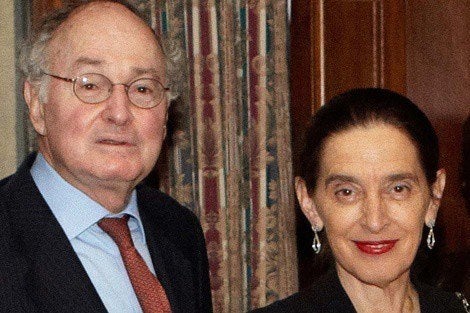[ Winter 2014 ]
Case-based teaching, “flipped” classrooms, and a focus on leadership skills—these will be key changes as Harvard School of Public Health ambitiously redesigns its educational strategy. In recent years, the effort to help future students make a dramatic impact on public health has received critical support from the Charina Endowment Fund and Richard L. (MBA ’59) and Ronay Menschel of New York City.
The recent $12.5 million gift from the Menschels—longtime supporters of HSPH—establishes the Transforming Public Health Education Initiative, which enables the School to develop innovative teaching methods, train faculty, harness new educational technologies, and highlight fieldwork and experience-based learning.
The gift to the HSPH campaign will underwrite faculty efforts to infuse the educational experience at HSPH with more case-based and field-based “real world” learning. It will accelerate the move toward “flipped classrooms,” in which lectures are delivered online, thereby freeing class time for back-and-forth discussion and a focus on the kind of problem solving that students will encounter in their careers. And it will help the School update its master’s degree program for health professionals and create a new Doctorate of Public Health (DrPH) degree.
“We support Harvard School of Public Health with our philanthropy because we believe in the importance of public health and the opportunity to expand the knowledge and skill sets of future public health leaders through the use of technology and case studies,” said Ronay Menschel.
Added Richard Menschel, “Improving learning leads to better-prepared students who can more successfully address the major public health issues facing the world today.”
The Menschels have made HSPH one of their top philanthropic priorities for more than 20 years. Since 1989, they have made gifts in general support of the School’s efforts, as well as in focused areas such as health communications; AIDS, cancer, and infectious diseases research; and improving the humanitarian response to emergencies around the world.
In another gift, the Menschels have provided $2.5 million for Ariadne Labs, a joint initiative of HSPH and Brigham and Women’s Hospital headed by HSPH’s Atul Gawande, to improve health systems performance globally.
The Menschels have also established key professorships and fellowships at the School. The Richard L. and Ronay A. Menschel Senior Leadership Fellows Program, launched in 2012, brings high-level leaders in government, nonprofits, and journalism to HSPH for three months to share their expertise. The Horace W. Goldsmith Fellowships—for which six students are chosen each year to receive $20,000 on the basis of need and merit—were established with support from the Menschels in 2007.
Professorships endowed by the Menschels include the Harvey V. Fineberg Professorship of Public Health, established in 2005 in honor of the former dean of the School and Harvard provost, which is currently held by professor of biostatistics Nan Laird; and the Richard L. Menschel Professorship in Public Health, created in 2011 and held in tandem with the directorship of the Division of Policy Translation and Leadership Development, and currently held by Robert Blendon, senior associate dean for policy translation and leadership development.
Richard and Ronay Menschel reside in Manhattan, where Richard is a senior director at Goldman Sachs and Ronay serves as chairwoman of Phipps Houses and The Trust for Governors Island. Over the years, the Menschels have shared their generosity with several Harvard schools and programs. Richard Menschel has also held many leadership roles with Harvard, including national co-chair of the Harvard University Campaign from 1992 to 1999, service on the University Campaign Executive Committee, and honorary co-chair of the forthcoming HSPH Capital Campaign. He is a recipient of the Harvard Medal.
Richard Menschel sees his gifts to HSPH as long-term investments with wide repercussions. “Better educated public health leaders,” he said, “have the capacity to improve the health of us all.”
